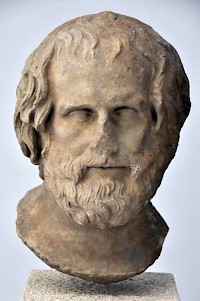Aristophanes on the Megarian Decree
Megarian Decree (c. 432 BCE): a set of economic sanctions, proposed by Pericles, against Megara, which was one of the causes of the Archidamian War.

In his comedy the Acharnians, written in the winter of 426/425, when the Archidamian War had already lasted almost six years, the playwright Aristophanes tells the story of a peasant named Dicaeopolis, who concludes a private peace with the Spartans. In an aside to the audience, the hero reminds the Athenians of the events that led, in his view, to war. Unlike the historian Thucydides, who seeks the deepest cause of the Peloponnesian War in human fear for someone else's power, Aristophanes/Dicaeopolis offers a more mundane explanation: Pericles's embargo against Megarian merchants, which was meant as a punishment for a sacrilege committed by the Megarians.
Of course, Aristophanes is writing comedy, and he gives the Megarian Decree a farcical twist. We are supposed to believe that the embargo was caused by drunken boys who carried of a prostitute from Megara: a parody on the first chapters of the Histories by Herodotus of Halicarnassus, which in turn was based on the great epics about the Trojan War.
The translator of Acharnians 515-538 is unknown.
Aristophanes on the Megarian Decree
Some men (I do not say the city,
note particularly that I do not say the city),
some wretches, lost in vices, bereft of honor,
who were not even citizens of good stamp, but strangers,
have accused the Megarians
of introducing their produce fraudulently,
and not a cucumber, a leveret,
a suckling pig, a clove of garlic, a lump of salt was seen
without its being said,
"Halloa! these come from Megara,"
and their being instantly confiscated.
Thus far the evil was not serious
and we were the only sufferers.But now some young drunkards go to Megara
and carry off the harlot Simaetha;
the Megarians, hurt to the quick,
run off in turn with two harlots
of the house of Aspasia;
and so for three whores
Greece is set ablaze.Then Pericles, aflame with ire on his Olympian height,
let loose the lightning, caused the thunder to roll, upset Greece
and passed an edict, which ran like a drinking song,
"That the Megarians be banished both from our land
and from our markets and from the sea and from the continent."Meanwhile the Megarians, who were beginning to die of hunger,
begged the Spartans to bring about the abolition of the decree,
of which those harlots were the cause;
several times we refused their demand;
and from that time there was horrible clatter of arms everywhere.